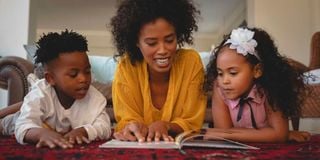Premium
The plight of being second-born child

Being a second child, I did not get the kind of pampering, pronounced concern and indulgence that first-borns tend to get.
What you need to know:
- With my first-born, my heart would almost jump out of my chest whenever he fell.
- As for my second-born, whenever she tripped and fell, I would respond with a nonchalant, “amka… get up.”
It’s true what they say about the second-born being the forgotten child, the neglected one who is often an afterthought, not because he or she is not loved, but because the first-born effectively wiped off the anxiety that comes with first-time parenting. As a result of being the by-the-way child, the second-born has no option but to become self-reliant because most of the time, one is left to their own devices.
I am a second-born, and for as long as I can remember, I have been self-sufficient – to the point of making those close to me feel inadequate because it seems as if I don’t need them. Yet this is not the case, it only seems this way because being a second child, I did not get the kind of pampering, pronounced concern and indulgence that first-borns tend to get, forcing me to adapt to situations fast, to improvise and to make do with whatever that was handed down to me. But I only got to understand all this about myself when I got my second-born.
When I got my first child, I was so anxious, I barely slept, in fact, I would wake up several times during the night to ascertain that my child was still breathing. By the time my son came, I had read tons of books about parenting, but all that knowledge did not take away the constant apprehension that besieged me.
The crying, especially, terrified me, and I cannot count the number of times I rushed to hospital at ungodly hours of the night, sure that my child was dying. The receptionists at the hospital I frequented even got to know me, and would quip, “You’re back…” with amused smiles.
Poop in a ‘strange’ colour
More often than not, I would return home empty-handed, with no medication, the doctor having assured me that there was nothing wrong with him. And so I would head back home at 3am in the morning feeling quite stupid, only to do it again a week later. The frequent diagnosis was ‘gas’, which, I was reminded, could be resolved by burping him and holding him a certain way.
Once, I rushed to hospital in a panic, armed with a diaper full of poop in a ‘strange’ colour, a hue which I convinced myself was an indication of a serious illness. That doctor, try as he might, could not stop himself from bursting out in prolonged laughter, and after catching his breath, told me that there was nothing abnormal about the colour of the sample I had come bearing.
By the time my second-born came by, I was a skilled pediatrician, having graduated from the school of experience. Nothing fuzzed me, not even my daughter’s crying, therefore the trips to hospital were far between. Whenever she tripped and fell, I would respond with a nonchalant, “amka… get up,” before turning my attention to other pressing matters. Children, I had since learned, fall all the time before their master balance. By failing to dwell on her every discomfort, she learned to toughen up and recover fast.
With my first-born, my heart would almost jump out of my chest whenever he fell, sure that he had broken something, stopping short of crying along with him. Now I look at my second-born and I see myself – she is able to keep herself entertained and is at home in her own company while the self-pity does not go on for very long. If only we knew what we know while raising our first-borns, the first-time parenting experience would be like a leisurely walk through a park.
The writer is editor, Society & Magazines, Daily Nation; [email protected]





